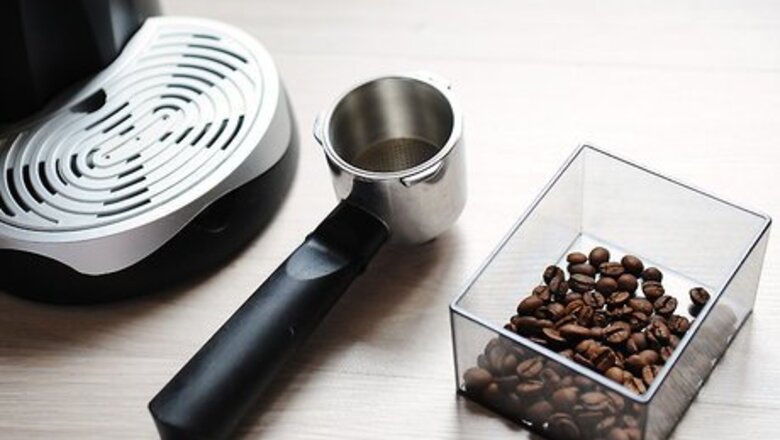
views
Making Espresso in an Espresso Machine
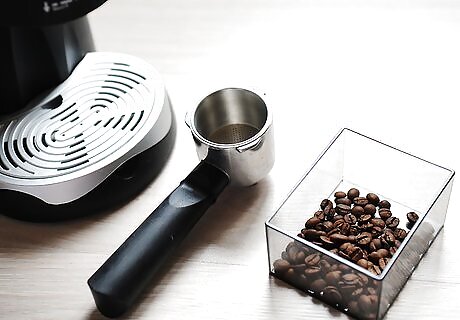
Grind your coffee beans. Buy a quality whole bean coffee and grind it in a “burr” coffee grinder on an espresso (very fine) setting. Aim for a consistency close to that of table salt. Avoid buying pre-ground coffee or coffee beans that have been ground too far in advance of using them. Grind them right before brewing for the freshest coffee and best taste. To achieve the same authentic taste as a Starbucks espresso, try buying their signature espresso roast from a Starbucks location or grocery store. A specific espresso roast is not a requirement to make espresso, but whatever type of roast you do use needs to be very finely ground. An espresso roast is usually an oilier bean, which can make the fine grinding process smoother.
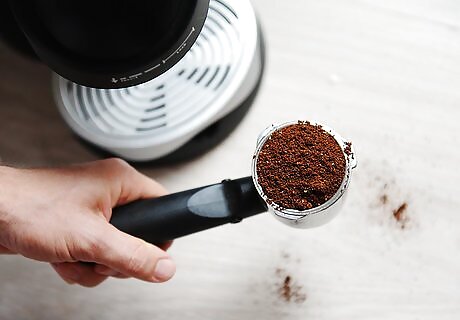
Add the ground coffee to your portafilter. Pour your ground coffee into the portafilter (the handled tool with a basket for holding grounds) that came with your machine. A single shot is typically made with 1 ounce (2 tablespoons) of grounds. This is the quantity in a Short or Tall size Starbucks beverage, unless you ask for more. A double shot is typically made with 2 ounces (4 tablespoons) of grounds. This is the quantity in a Grande or Venti size Starbucks beverage, unless you ask for more or less. A triple shot is typically made with 2 ounces (6 tablespoons) of grounds. This is the quantity in a Trenta size Starbucks beverage, unless you ask for less.
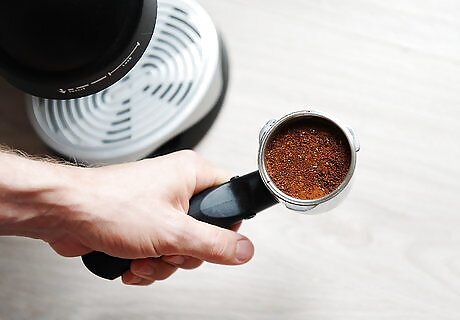
Tamp down your grounds. Tap your grounds down gently with a finger, then apply an even downward pressure to the grounds with a tamper that you have for your machine. The tamper should be at least 30 pounds and fit the basket snugly. This step compacts the grounds so that water can’t get through as easily, forcing it to interact with the coffee. Use a tamper of a higher weight if you prefer.
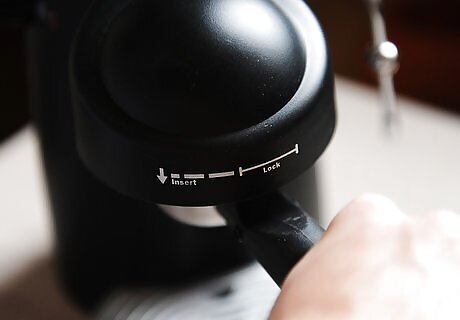
Place the portafilter in your machine and add water. Add cold, filtered water to the water reservoir of your machine and lock the portafilter into the grouphead of the machine. Put a cup under the spout where the extracted coffee will pour out. Depending on your machine, you may be able to make other adjustments, like water temperature. Ideal temperature for extracting espresso is 195-205 degrees Fahrenheit. Use a small cup meant for espresso called a demitasse cup under the machine if you want to enjoy espresso on its own, or a larger cup or mug of your desired size if you plan to make additions for another beverage that uses espresso.
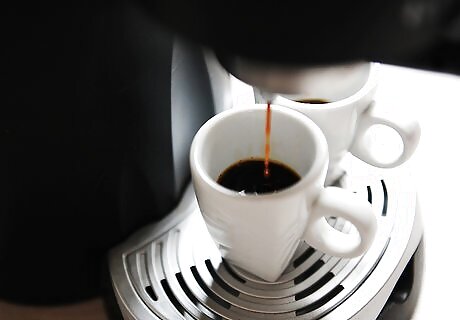
Start the extraction process. Set your machine to begin brewing, which will vary based on your machine. No matter the amount of grounds you used, the process should take about 20-30 seconds to complete. If you use a clear cup or shot glass, you can observe the different parts of a successful espresso: crema (the top layer that is light in color and foamy), body (the middle layer of dark brown), and heart (the bottom layer that is darker brown or black).
Making Espresso with Other Methods
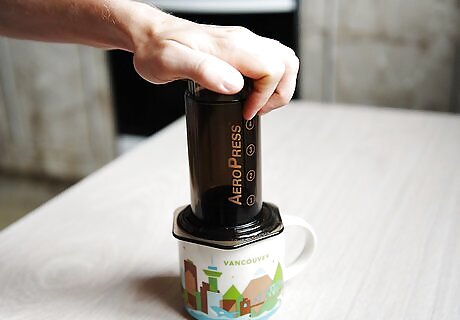
Use an AeroPress. Get a device called an AeroPress, which is a small, portable chamber with a plunger. Place a small round filter into the cap and screw it onto the chamber. Pour your 1-4 ounces (2-8 tablespoons) of grounds into the chamber and place it over a cup. Pour hot water into the chamber up to the markings for 1, 2, 3, or 4 shots. Stir and then press down gently with the plunger to extract espresso into the cup. Note that some people don’t consider the brewed coffee from an AeroPress to be a true espresso, as it does not produce a crema layer and is not quite as strong. However, an AeroPress achieves nearly the same effect and flavor, and is much more affordable and portable than an espresso machine.
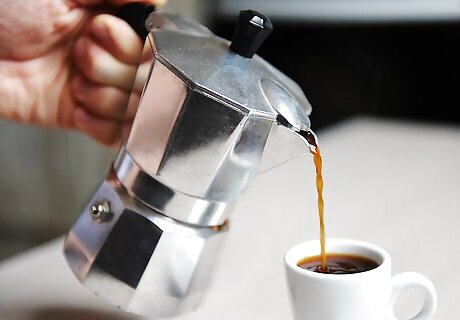
Use a moka pot. Obtain a stovetop espresso maker, also called a moka pot. Pour cold water into the bottom chamber of the pot up to the fill line and place 1-3 ounces (2-6 tablespoons) of grounds into the filter basket that fits into that chamber. Then screw on the top chamber where the brewed espresso will end up and place the pot over high heat on the stove to brew. Note that this method may not brew with quite the same taste, layers, and quality of espresso from an espresso machine, as the steam pressure and filtration methods are not the same. However, a moka pot is much more affordable and portable than an espresso machine.
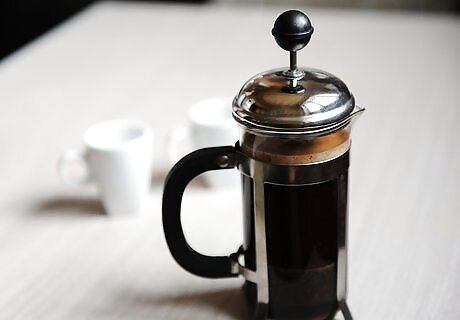
Use a French press. Try making an espresso with a coffee press, also called a French press, which uses a glass carafe and a plunger. Add 1-3 ounces (2-6 tablespoons) of grounds to the carafe and then slowly pour in enough hot water to cover the grounds. Allow the coffee to brew in the water for a few minutes before pressing the plunger down to separate the grounds and brewed espresso. Note that this method doesn’t produce a true espresso my most people’s standards, as it doesn’t use nearly the same steam pressure. However, you can more closely simulate a strong espresso by leaving the grounds and water to interact for longer. A French press is a much more affordable and portable option than an espresso machine.
Making Drinks Using Espresso
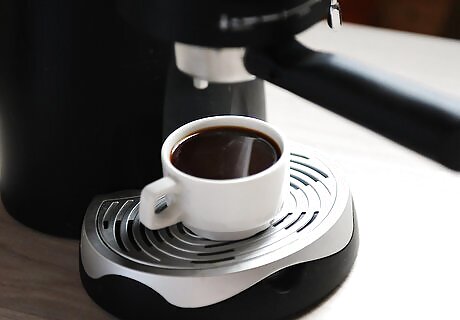
Enjoy as a straight espresso or doppio. Drink a single shot of espresso on its own, or a doppio, which is two espresso shots on its own. You can also achieve a ristretto, which is a short shot using ¾ of a typical 1 ounce (2 tablespoons) shot. Or try a lungo, which is a long shot made with 1.5 ounces (3 tablespoons) instead of 1.
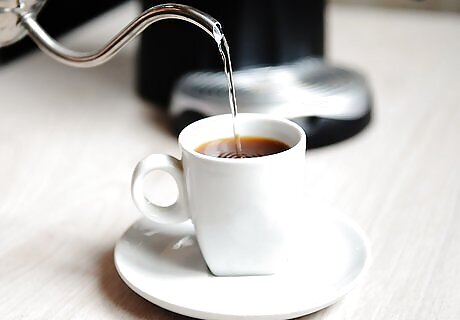
Add water for an americano. Pour your desired amount of hot water into a cup with your brewed espresso to make a classic americano drink.
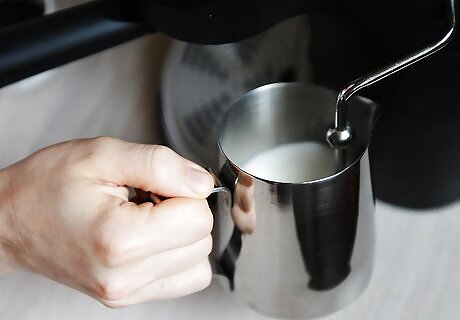
Steam milk for a drink. Steam milk in your espresso machine by filling a steaming pitcher with cold milk and placing the steam wand of your espresso machine into the milk to heat and froth it before adding it to your espresso. You can froth milk without an espresso machine by using a handheld frother, a coffee press, or a simple jar to froth it, then heat it in the microwave before adding it to espresso.
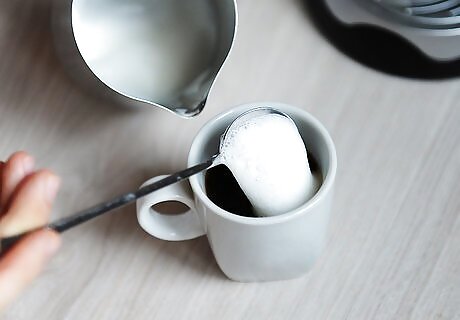
Add a dollop of milk foam for a macchiato. Make a simple macchiato with just a small layer of frothed milk spooned onto the top of a shot of espresso. Note that Starbucks creates a “latte macchiato” that combines the two traditional drinks together, using much more milk than the typical dollop used for a standard macchiato.
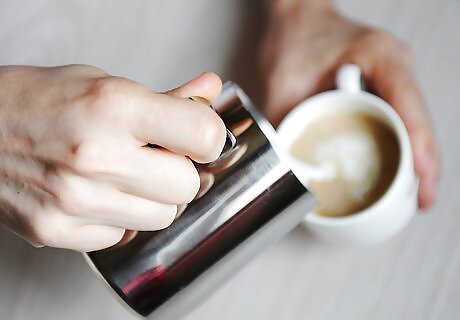
Make a cappuccino with steamed milk. Add an amount of steamed milk equal to your shot(s) of espresso. The milk should have little to no foam. For a variation, try an espresso con panna by replacing steamed milk with whipped cream. Or make a café breve by substituting regular steamed milk with steamed half-and-half (light cream).
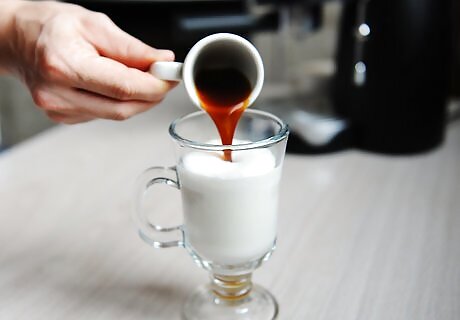
Add more milk for a latte. Make a latte, also called a café con leche or café au lait, by adding more milk to your espresso. Pour 6 to 8 ounces (¾ to 1 cup) of steamed milk with milk foam over your espresso shot(s). Try a variation by making a flat white, which uses the same quantity of milk but none of the frothed milk foam. Make a mocha by adding chocolate syrup into the latte with the steamed milk. This is also when you can add any other flavoring syrups to make a latte with hazelnut, vanilla, caramel, etc.

Opt for iced or blended drinks. Make any of the above drinks into a cold and refreshing beverage by adding espresso, ice, and your desired amount of sweetener and milk to a blender for a blended frozen drink. For an iced drink, simply add ice to your prepared espresso drink. You can pour the ingredients into a cup first if it helps you to get the proportions right. Try freezing espresso or regular drip coffee into an ice cube tray the night before. Add these coffee ice cubes to your drink so that it doesn’t get watered down.




















Comments
0 comment